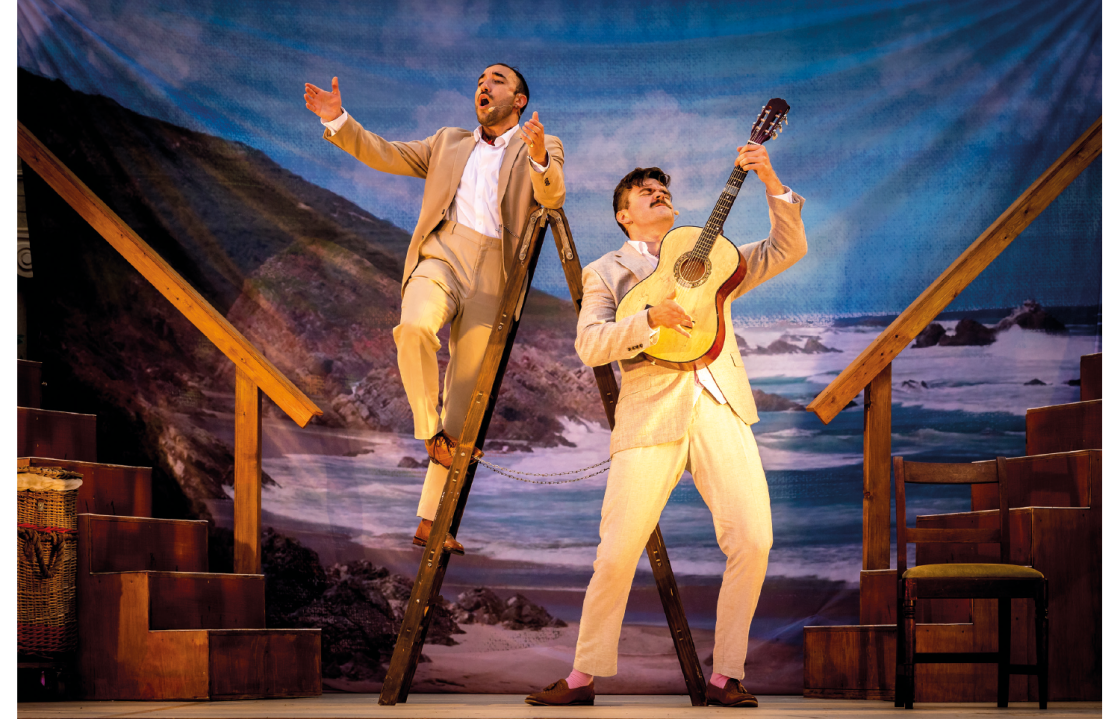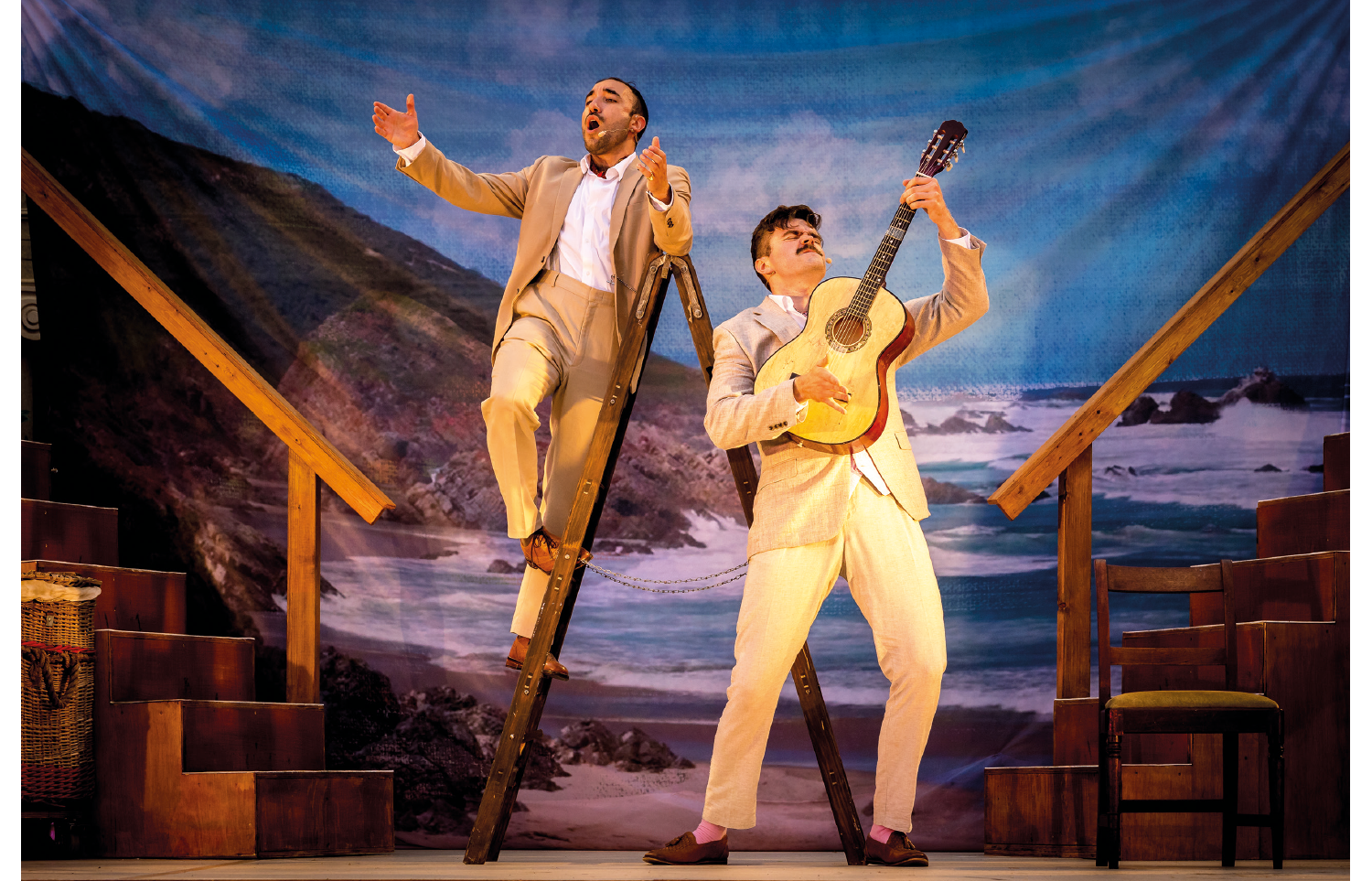Waterperry is one of the UK’s youngest summer opera festivals: it started up in 2018, at the northern limit of the species’ natural habitat. You leave the motorway at Oxford services and double back through the fields to the hamlet of Waterperry. Drive past the ‘Cats Crossing’ sign and the life-sized effigy of Rowan Atkinson (honestly) and you’re there. There’s a big house (slightly run to seed), a farm shop, a garden centre and a nursery containing the national saxifrage collection, which is not something you see every day. The opera festival squeezes in between them. Let’s do the show right here! Well, why not?
The Barber was literally staged on the lawn. And if it rains? ‘We hope it won’t. Would you like a poncho?’
In other words, it exudes charm, with a strikingly young and enthusiastic artistic team plus a pizza van, which after a summer of rip-off picnics and lukewarm fizz comes as cheese-topped manna. So far, so quirky, though as you file through the discount plant pots you do wonder if the opera will be just as ad hoc. In a word, no – not even slightly. This is a seriously impressive artistic operation. Neither of this year’s two productions would have disgraced a national touring company, and one of them was excellent by any standard.
The Barber of Seville was directed by John Wilkie, and staged on the lawn. Literally on the lawn: the orchestra is covered, but everyone else is at the mercy of the pigeons. And if it rains? ‘We hope it won’t,’ said the steward. ‘Would you like a poncho?’ Anyway, it didn’t. The orchestra was scaled down and amplified; probably unavoidably, though the ears soon adjusted. Let’s not forget – or forgive – that within recent memory at least two infinitely better-resourced festivals presented operas with a pre-recorded orchestra.
Charlotte Corderoy conducted – bundles of Italianate warmth – and the cast (plus a small but smartly choreographed chorus) bounced all over the multi-level set. Wilkie updated the action to Franco-era Spain, making Bartolo (Kieran Rayner) a movie mogul and Almaviva (Brenton Spiteri) a renegade star. Unusually for an updated opera, the English translation actually reflected this. It was by Christopher Cowell, and it fizzed. ‘This is bonkers,’ pealed Rosina (Esme Bronwen-Smith); ‘Tell me, am I the baddie?’ asked a rueful Bartolo as the action hurtled to its conclusion.
Figaro carried the day, of course. Patrick Keefe made a strapping barber, with a dark, savoury voice and a megawatt stage presence. Bronwen-Smith was a positively Wagnerian Rosina – a heroine as feisty as this could surely have crushed Bartolo with her little finger. Spiteri wobbled a little, though his comic timing was spot-on. This is hair-splitting, of course (it comes with the job). The Barber of Seville is all about fun in the sun, and if one was in short supply, the company provided buckets of the other.
The second production, Britten’s The Turn of the Screw, was directed by Rebecca Meltzer and it was exceptional. Britten’s chamber-sized scoring allowed the Festival to field a full ensemble, and the setting was an open-air amphitheatre wedged between the garden centre and the woodlands beyond. It sounds unlikely, but with minimal sets – mostly rippling black drapes – and skilful lighting by Catja Hamilton it evolved a powerful atmosphere as darkness drew in. Britten’s unearthly score mingled with the soughing of the trees, and I genuinely couldn’t tell if amplification was used or whether the space simply has exceptional acoustic properties. Either way, the conductor, Bertie Baigent, achieved a precision and an expressive subtlety that you would have thought impossible in an outdoor venue.
Meanwhile, Waterperry’s commitment to young artists meant that we had a Governess who really embodied the role. Charlotte Bowden was intensely touching, singing clearly and intelligently (like the whole cast) while the despair rose in her features like a very slow tide, mirroring the hollowed-out misery etched on the face of Sian Dicker as Miss Jessel. It’s rare to see a poor performance from the two children but the pair here – Beth Burdge (Flora) and Ivo Clark (Miles) – brought a special level of eerie innocence. As Peter Quint, Robin Bailey peered out of the darkness, his satyr-mask of a face floating in the gloom at the edge of the theatre. Clenched and malevolent, he stalked the stage like a predatory bird, singing with an eloquence and a slightly tart sweetness that heightened the sense of festering evil.
One other thing: both operas were sung without surtitles, and yet almost every word was audible and expressive. That’s difficult enough to achieve in a theatre, and almost impossible in the great outdoors. But like many things that are supposed to be impossible, the team at Waterperry has simply got on and done it. I liked them; you will too, and although the Festival has finished for this year you should pencil a trip up the M40 next summer. Tell them we sent you.








Comments